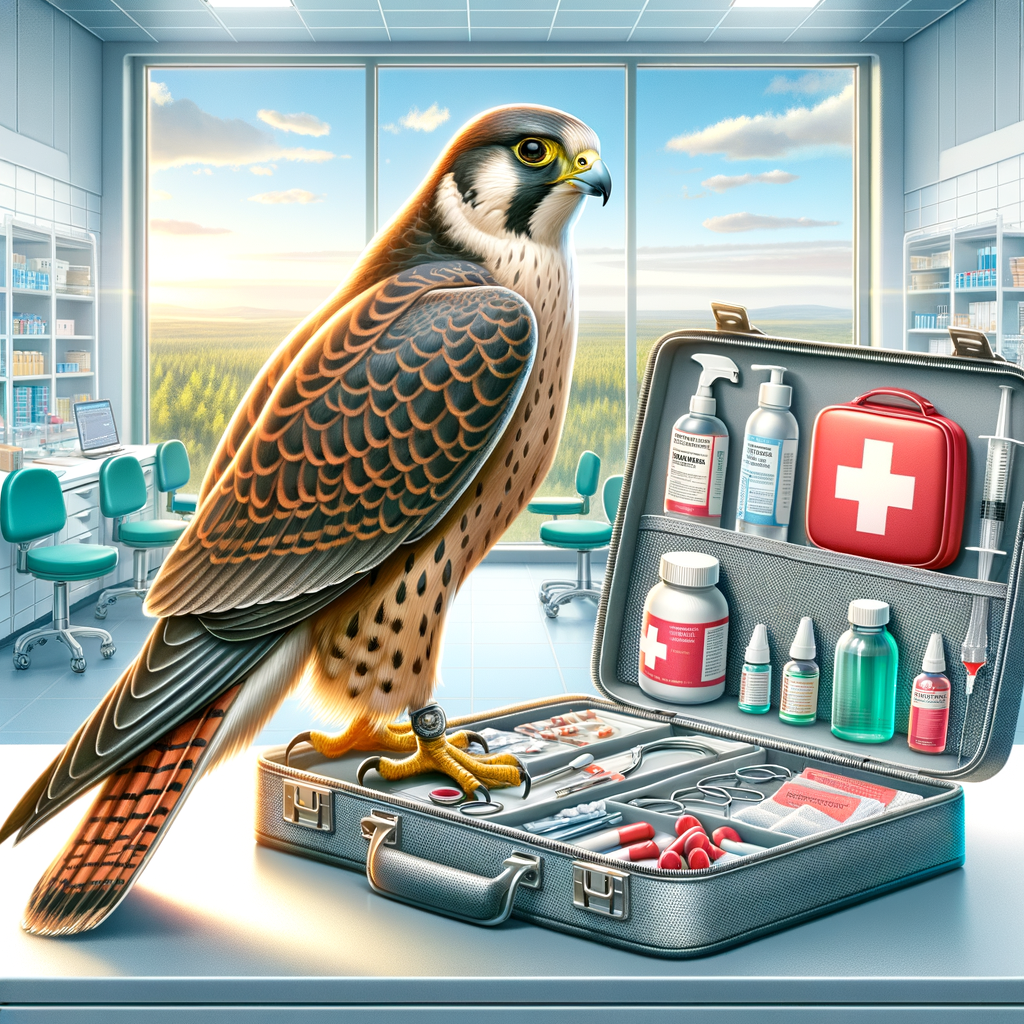Essential Health Care Tips for Falcons
- Regular Health Checkups: Ensure your falcon gets regular health checkups from a qualified vet.
- Proper Nutrition: Provide a balanced diet with the right amount of proteins, fats, vitamins, and minerals.
- Clean Water: Always offer fresh, clean water daily.
- Safe Housing: Keep their living environment clean, safe, and spacious to prevent injuries and infections.
- Mental Stimulation: Engage your falcon with activities and exercises to keep them mentally sharp.
- Grooming: Regular grooming helps maintain their feathers and overall hygiene.
- Watch for Illness: Learn to identify signs of illness and consult the vet promptly if needed.
- Vaccinations and Medications: Keep up with necessary vaccinations and follow the vet’s guidance on medications.
- Clean Feeding Equipment: Always clean feeding equipment to avoid contamination and illness.
- Weight Monitoring: Regularly monitor your falcon’s weight to ensure they stay within a healthy range.
Essential Falcon Health Care: Why Your Falcon’s Wellness Matters
Top of the morning to you, fellow falcon enthusiasts! Imagine you’re in the lush landscapes of Ireland, surrounded by rolling green hills and ancient castles. Just as a good Irish shepherd wouldn’t let his prized sheep wander alone in the wild without care, a falconer must ensure their majestic bird of prey is in tip-top condition. Here at Learn Falconry, we believe that taking care of our feathered friends isn’t just a responsibility; it’s a way of life that ensures their health and happiness.
Just like the Irish countryside needs nurturing to stay beautiful and bountiful, falcons require specific attention to keep them soaring high and strong. In this article, we’ll guide you through the basic health care practices that will make your falcon feel as lively as a leprechaun and as majestic as the Cliffs of Moher. From nutrition to regular check-ups, we’ll tell you everything you need to know about keeping your falcon in peak health. Trust us; you won’t want to miss a single detail because every tip we share is as vital as gold at the end of the rainbow.
So grab a cozy seat and keep reading to discover the secrets to a happy, healthy falcon!
Beginner’s Guide to Basic Falconry Health Care
Falcon health care is essential for anyone practicing falconry. As beginners, understanding the basics of falcon health is crucial to ensure that the falcon remains strong, active, and healthy.
Basic Health Care for Falcons
Falcons are majestic birds that need specific care to thrive. In falconry, taking care of a falcon involves more than feeding and training’it requires regular health check-ups, proper nutrition, and knowledge of common diseases.
One of the critical aspects of basic falconry care is maintaining a clean environment. Falcons should have a well-maintained mews (the specialized housing for birds of prey) with clean perches and fresh water. This prevents infections and ensures the birds’ overall well-being.
Nutrition is another fundamental part of falcon care. Falcons are predators, so their diet includes a variety of fresh meat. You can learn more about what to feed your falcon here.
Common Diseases of Falcons
Understanding common diseases is essential for beginner falcon health care. Some of the typical diseases that falcons may encounter include:
- Aspergillosis: A fungal infection that affects the respiratory system. It’s common in damp conditions and requires immediate veterinary attention.
- Coccidiosis: This parasitic infection can affect the intestinal tract, causing diarrhea and weight loss. Proper hygiene and regular fecal tests can help prevent this disease.
- Bumblefoot: An infection of the foot pad caused by poor perch conditions or injuries. Ensuring perches are well-maintained and clean can prevent this condition.
To keep your falcon healthy, regular health check-ups with a specialized vet are necessary. Learn about common falcon health issues here.
Preventative Health Care for Falcons
Preventative care is just as important as treatment. Weight management is crucial, as underweight birds can become weak, and overweight birds may face flight issues. Monitoring the falcon’s weight regularly and adjusting their diet accordingly can help maintain their optimal health. More details on weight management can be found here.
Falcon Care Equipment
Having the right equipment is also part of basic falconry care. Items like jesses, leashes, and hoods are necessary to safely handle and train your falcon. You can explore essential falconry equipment here.
Training and Exercise
Proper training ensures that a falcon stays physically and mentally engaged. Training not only improves the bird’s hunting skills but also fosters a strong bond with the falconer. For beginners, it’s recommended to start with basic training techniques. Detailed training guides are available here.
With careful attention to health care and proper training, your falconry experience can be rewarding and enriching for both you and your magnificent bird. Explore more about falcon care and training tips, and get guidance on becoming a responsible falconer with resources on our website.
Basic Health Care for Falcons in 2024
Falcons are magnificent birds that require special care to ensure they remain healthy and strong. Here are some important aspects of basic health care for these raptors.
Indoor Facilities
Falcons need proper indoor facilities known as mews. These must have:
- Dimensions: Minimum of 8 feet in each direction.
- Conditions: Adequate ventilation, protection from weather, predators, and other birds.
Below is a table that summarizes the essential requirements for falcon mews:
| Facility Requirement | Description |
|---|---|
| Dimensions | Minimum of 8 feet in each direction |
| Ventilation | Adequate airflow |
| Protection | From weather, predators, and other birds |
| Space | Enough room for exercise |
Care Requirements
Falconers must ensure other essential care aspects:
- Food and Water: Provide adequate and nutritious food and clean water daily.
- Veterinary Check-Ups: Regular visits to a veterinarian to catch any potential health issues early.
Veterinary Care
Falcons can get injured, and they must have proper veterinary care:
- Treatment: Any injured raptors should be examined and treated by a vet.
- Documentation: The vet needs to provide a written statement about the injury and whether the falcon can be used for falconry.
Common Diseases in Falcons
Falcons can suffer from various diseases. Some of the most common ones include:
Lead Poisoning
- Cause: Often originates from hunting with lead ammunition.
- Effect: It poses a serious threat to falcon health, leading to toxicity.
Capillaria and Other Parasites
- Capillaria: An internal parasite causing infections.
- Coccidiosis: A single-cell parasite affecting the bowels.
- Trichomoniasis: Another internal parasite disrupting normal health.
Newcastle Disease
- Other Name: Also called Epilepsy.
- Symptoms: Can cause seizures and other neurological symptoms.
Health Issues
Some health issues befall falcons regularly:
Uropygial Gland Problems
- Also known as the preen gland, problems here can affect the falcon’s ability to preen.
Respiratory and Other Diseases
- Aspergillosis: A fungal disease.
- Avian Tuberculosis: A bacterial disease.
Preventative Measures
Preventing these diseases involves proper care:
- Nutrition: Ensure a balanced diet.
- Hygiene: Maintain cleanliness to prevent infections and pests.
By following these guidelines, falconers can ensure the well-being of their falcons and enjoy the rewarding experience of falconry. Proper awareness and timely actions can greatly enhance the health and longevity of these majestic birds.
Ensuring Your Falcon’s Health and Well-Being
Taking care of a falcon requires dedication and attention to various aspects of their health and environment. From maintaining proper indoor facilities to ensuring regular veterinary check-ups, providing adequate food and water, and protecting them from both the elements and predators, falconers have a lot to manage. Falcons can suffer from a range of diseases such as lead poisoning, internal and external parasites, and fungal and bacterial infections, which can be mitigated through proper hygiene, nutrition, and regular health monitoring.
Additionally, it’s essential to understand the regulations and best practices for falconry, including annual reporting, conservation education, and even raptor propagation and rehabilitation when needed. By adhering to these guidelines, falconers can ensure their raptors remain healthy and vibrant, contributing positively to conservation and educational efforts.
In the end, the well-being of your falcon reflects the care you put into maintaining their health. By staying informed and vigilant, you ensure that your majestic raptor thrives, symbolizing a harmonious balance between humans and nature.



